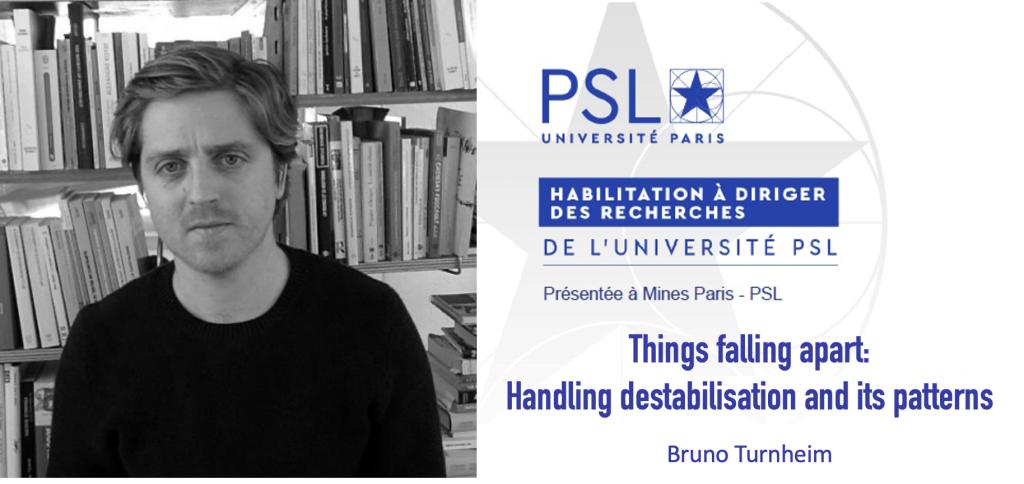The Center for the Sociology of Innovation (i3, UMR CNRS 9217, Mines Paris-PSL) has the pleasure of inviting you to attend the HDR (Habilitation à Diriger des Recherches) in STS (Sciences, Technologies, Societies) defense of
Bruno Turnheim
LISIS/INRAE, University of Manchester
Tuesday 18 November, 3-6pm
at Mines Paris-PSL, 60 bd. Saint-Michel, Paris, room L109
Original dissertation title
Things falling apart:
Handling destabilisation and its patterns

Guarantor: Brice LAURENT (CSI, Ecole des Mines)
Abstract [EN]:
Urgent environmental challenges, uncontrollable technologies, unimaginable futures. This habilitation takes current troubles as a starting point for thinking through the falling apart of things as major question for the social sciences. Seeking to overcome the disorienting notions of catastrophe and crisis, it proposes alternative ways to deal with existential challenges to established things. The falling apart of things is framed as a process of socio-technical destabilisation involving the articulation of problem fronts, the deployment of intentional action and strategies, and changing commitments to reproductive activities.
The habilitation draws on four case studies in different sectors, places, and time-periods: the curiously rapid dismantling of tramways in and around Paris (1900-1937), destabilisations of coal in Britain (1914-1967, 1967-1997), the never-ending non ending of pesticides in French agriculture (1945-present), and the challenging cohabitation of nuclearity and wine in the lower Rhône valley (1955-2011). The analysis combines longitudinal case narratives to examine of patterns of change with more situated perspectives to gain insights on how such processes can be handled.
The habilitation ends with reflections about living with, knowing about, and handling the falling apart of things.
Résumé [FR]:
Urgence environnementale, technologies incontrôlables, futurs inimaginables. Cette HDR prend ces troubles actuels comme point de départ pour un réflexion sur les fins des choses comme question majeure pour les sciences sociales. Cherchant à surmonter les désorientations des notions de catastrophe et crise, elle propose des moyens alternatifs pour s’intéresser aux défis existentiels auxquels les choses établies doivent faire face. Les fins des choses sont appréhendées comme processus de déstabilisation socio-technique impliquant l’articulation de fronts de problèmes, le déploiement d’action stratégique, et des engagements changeants envers les activités reproductives.
L’HDR s’appuie sur quatre études de cas dans différents secteurs, lieux et périodes : l’étonnamment rapide démantèlement des tramways à Paris et ses environs (1900-1937), la déstabilisation du charbon en Grande-Bretagne (1914-1967, 1967-1997), l’interminable non fin des pesticides dans l’agriculture en France (1945-présent) et la difficile cohabitation entre nucléaire et viticulture dans la vallée du Rhône (1955-2011). L’analyse combine cas longitudinaux pour l’examen de motifs de changement avec des perspectives situées pour saisir la tractabilité de ces processus.
L’HDR se clot par des réflexions pour vivre dans, comprendre et avoir prise dans les fins des choses.
Jury members:
Silke BECK (STS, TU Munich)
Paul LANDAUER (ENSAParis-Est, UGE)
Brice LAURENT (CSI, Ecole des Mines)
Ulrike FELT (STS, University of Vienna)
Andy STIRLING (SPRU, University of Sussex)
Stathis ARAPOSTATHIS (STS, University of Athens)
Please use this registration link to confirm your attendance (in person or remotely) by 11 November. This will help us organise the HDR defence and the subsequent reception.
For more information on preparing an HDR at CSI (Center for the Sociology of Innovation – i3, UMR CNRS 9217, Mines Paris-PSL) please contact Fabian Muniesa, head of the STS specialization (PhD/HDR).

